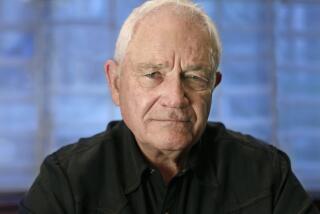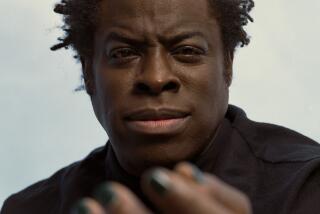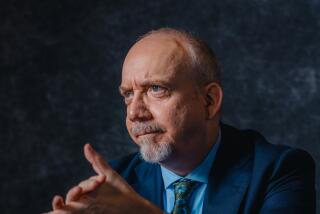IMDb file: Rupert Everett’s passion for Oscar Wilde inspires his new film
It was almost inevitable that Rupert Everett’s career would eventually lead him to starring in and directing a film about Oscar Wilde’s life.
The British actor, whose breakout role was in “Another Country” in 1984, has appeared in a vast array of movies and TV series, several of which are related to the iconic playwright. Everett, 59, spent nearly 10 years developing and creating “The Happy Prince,” which unfurls the story of the tragic final years of Wilde’s life. The recently released film marks Everett’s debut as a director, a career twist even he finds surprising.
“It wasn’t my plan at all, really,” Everett admits with his trademark wit and candor. “When I started writing the script, I had no intention of directing the film at all. But the director I wrote the film for was unavailable, and I approached about eight directors and all had their next four years filled up. After about three years, nothing had happened, so I thought I’d take matters into my own hands. Now, of course, I’m bristling with ideas, and I feel no one else could have directed my film.”
The actor, who first encountered the works of Wilde as a child, has a long work history with the writer. He’s appeared in two film adaptations of Wilde’s plays and has even performed “The Importance of Being Earnest” onstage in French.
“He’s always been an important character for me,” Everett notes. “And then I started acting in plays and that brought another dimension to him, because it was a naturally good fit for me to play Wilde. It worked for me. That’s a very magical thing when an actor discovers a writer who he can pull off really well.”
Here Everett discusses some of his most pivotal roles, from voicing Prince Charming in the “Shrek” sequels to embodying fan favorite George in “My Best Friend’s Wedding.”
“The Happy Prince,” Oscar Wilde (2018)
“I was compelled by the idea of this huge star on the skids. It was in the 19th century in Paris, which is, for me, a very glamorous and romantic and shadowy era. Wilde being exiled to Paris as a vagabond has always been a subject I’d loved. And he’s like a Christ figure, an early martyr, on the road to gay liberation. I was trying to kick-start my own career into a more exciting place and I felt that this role would be the best one for me to present myself in.”
“Parade’s End,” Mark Tietjens (2012)
“That was a job that I was very keen to get. It was written by Tom Stoppard, who is the most exquisite screenwriter and playwright. He adapted a book, and I think he did the most extraordinary adaptation of it. It was an interesting experience, because in the end, although it was a great project, it didn’t quite have the surreal quality of the writing. It transformed into something else, which was also very interesting.”
“Shrek 2,” Prince Charming (2004)
“It was the best job in the world. It was extremely well-paid and very little work. And the films were amazing. The characters were fantastic. You got to work four or five times in a year wherever you were. And then everyone went on a junket together and that was amazing too. The films are works of genius, I think.”
“The Importance of Being Earnest,” Algy (2002)
“That was the second of the Wilde films I did. Originally, I thought it would work best if I played all the roles. Sort of like that old English film ‘Kind Hearts and Coronets’ where Alec Guinness played all the parts. But that didn’t happen. And it was a very, very happy experience with Colin [Firth] and Judi [Dench] and Reese Witherspoon. That was the time when I realized how nice it was, in a way, getting older when you have a whole breadth of relationships with people. Knowing people in your business for a long time and then working with them is a great pleasure.”
“An Ideal Husband,” Lord Arthur Goring (1999)
“I think that was the more successful [Wilde] adaptation. ‘An Ideal Husband’ was very well-suited for the cinema. It was an interesting time to put the film out, because it was the same time as all the problems President Clinton was having and the whole notion of politics and scandal was very relevant.
“My Best Friend’s Wedding,” George Downes (1997)
“It was an incredible time for me. It was a period like when you’re on a freeway and there’s suddenly green lights all the way. My role in the film was actually quite minuscule in the beginning and completely unremarkable on the page. I had done a screen test about three times for it because [director] P.J. Hogan said, ‘You’re too right for the part.’ That often happens: Either you’re too right or you’re wrong. At the beginning of the shoot, P.J. wrote another scene for me and when I read that scene, which is the scene where I sing the song, I knew that the part was going to become something amazing. And it kept on getting better for me. It was absolutely magical. Suddenly, I was extremely successful.”
“Hearts of Fire,” James Colt (1987)
“I had been great friends with guitarist John Taylor from Duran Duran, and I based my character on him. I got to play in a stadium in Toronto with Bob Dylan and there was a whole audience standing there waiting to see some big band. We played in front of 20,000 people who were waiting to see some other concert and it was hysterical. It was very like being in a dream. They weren’t remotely interested in us. And it really was extraordinary being up there with Dylan pretending I was a rock star.”
“Another Country,” Guy Bennett (1984)
“This was my breakout part. And the movie, funnily enough, was distributed here in the states by Michael [Barker] and Tom [Bernard], who are distributing ‘The Happy Prince.’ So it’s an amazing full circle, because there’s hardly anyone in Hollywood still doing the same thing anymore. That’s amazing for me to be working with them again now.”
More to Read
Only good movies
Get the Indie Focus newsletter, Mark Olsen's weekly guide to the world of cinema.
You may occasionally receive promotional content from the Los Angeles Times.






